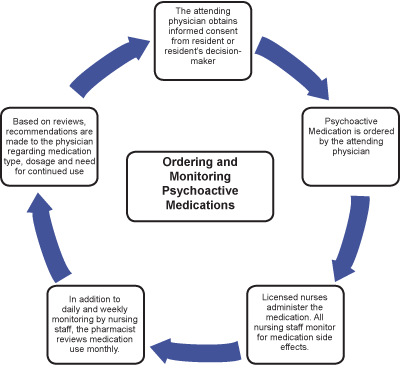
STATE & FEDERAL REGULATIONS

Federal Regulations
At the federal level, skilled nursing facilities are regulated by the U.S. Department of Health and Human Services’ Centers for Medicare & Medicaid Services (CMS).
Each facility is required to have a pharmacist review the use of psychoactive medications each month and report any irregularity to the attending physician, and director of nursing for prompt follow-up action.
Federal regulations also require that proper medication is administered by attending physicians and that residents must be free from unnecessary drugs. An unnecessary drug is any drug when used:
In excessive dose (including duplicate therapy): or
-
For excessive duration; or
-
Without an adequate monitoring; or
-
Without adequate indications for its use; or
-
In the presence of adverse consequences which indicate the dose should be reduced or discontinued; or
-
Any combination of the reasons above.
The intent of this regulation:
-
The medication regimen helps promote or maintain the resident’s highest practicable mental, physical, and psychosocial well-being, as identified by the resident and/or representative(s) in collaboration with the attending physician and facility staff;
-
Each resident receives only those medications, in doses and for the duration clinically indicated to treat the resident’s assessed condition(s);
-
Non-pharmacological interventions (such as behavioral interventions) are considered and used when indicated, instead of, or in addition to, medication;
-
Clinically significant adverse consequences are minimized; and
-
The potential contribution of the medication regimen to an unanticipated decline or newly emerging or worsening symptom is recognized and evaluated, and the regimen is modified when appropriate.
A resident and/or representative(s) has the right to be informed about the resident’s condition; treatment options, relative risks and benefits of treatment, required monitoring, expected outcomes of the treatment; and has the right to refuse care and treatment.
State Regulations
Skilled nursing facilities in the state are licensed, regulated, inspected and certified by the California Department of Public Health Licensing and Certification Program.
All facilities are required to have a pharmacist review the use of psychoactive medications each month and prepare appropriate reports.
The review of the drug regimen of each patient shall include all drugs currently ordered, information concerning the patient's condition relating to drug therapy, medication administration records and where appropriate, physician's progress notes, nurse's notes and laboratory test results.
The pharmacist is responsible for reporting, in writing, any irregularities in the dispensing and administration of drugs and other matters relating to the review of the drug regimen to the administrator and director of nursing for prompt follow-up action.
The pharmacist serves on the pharmaceutical service committee and patient care policy committee.
Informed Consent
The state of California also requires informed consent:
-
Residents and/or their families must be informed about their medications. This means no one receives psychoactive medications without their permission or the permission of their authorized decision-maker.
-
Resident health records must contain documentation that informed consent has been obtained for the administration of psychotherapeutic drugs.
-
Residents have the right to refuse treatment.
Skilled nursing facilities face routine, unannounced inspections. Additionally, state survey teams inspect skilled nursing facilities on an annual basis to ensure compliance with all regulations. Fines are issued for non-compliance.